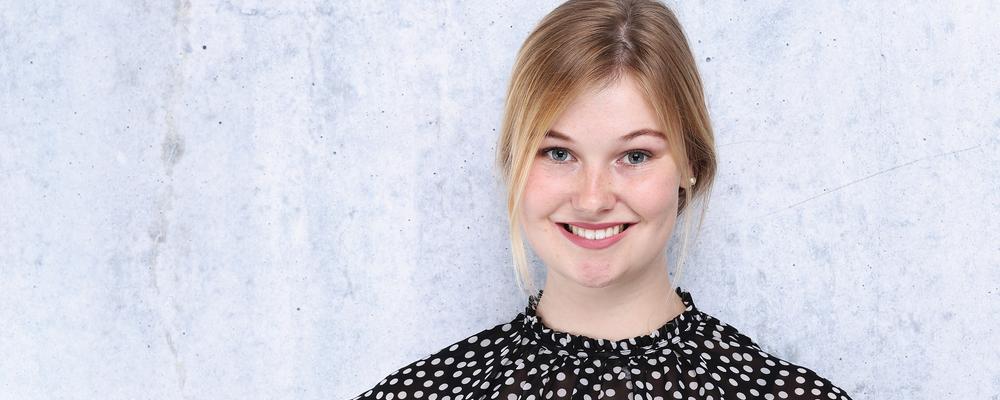
- What kind of background do you have?
- How did you end up in a master’s programme in Sweden?
- "Innovation challenge" with the aim to strengthen the urban planning process with digital tools
- What are your plans after graduation?
- The housing situation seems to be a big thing…?
- What do you think of the student life in Gothenburg?
- Information on the education
Interview with Maria Weise
Interview with Maria Weise from Neubrandenburg in Germany, who was in her first year in the master’s programme Digital Leadership when the interview was made.
What kind of background do you have?
– I have a dual-bachelor's degree in International Management for Business and Information Technology from the Cooperative State University in Mannheim. The "dual" part means I was studying for three months and then working for three months at IBM, then studying again and so on. I really liked the practical approach as you apply your new knowledge almost immediately. And due to the international approach of the programme I also got the opportunity to work in Beijing for three months.
How did you end up in a master’s programme in Sweden?
– Maybe because I had been to Sweden before I applied. In high school in Germany we had an exchange programme with a high school in Skövde in Sweden. I was in Skövde for a week and one of the days we also went to Gothenburg. This gave me a good first impression and some knowledge about the city.
– Hence, I was looking for master studies in various places in Sweden as well as in Denmark and Germany. I found the description of the master's programme in Digital Leadership very attractive and became interested. In Germany, for example, I couldn’t find a master’s programme that was still within IT but with a focus on management and leadership in the emerging digital world. I also liked that there are just one or two courses in parallel at the programme in Digital Leadership. When I was studying in Germany, I was usually following five courses at the time – with just one or two courses you get a larger focus and can go deeper into the subject.
The Digital Leadership programme is a mix of innovation and leadership within IT
– The master’s programme in Digital Leadership is a mix of innovation and leadership within IT, helping you to become an active part in the digital transformation of business and society. Generally, I feel that this programme prepares you for diverse options in your future career, such as giving you the capabilities and skills a prospective manager need to guide organisations on the pathway of digitalization, or how to innovate and start your own business in the future.
"Innovation challenge" with the aim to strengthen the urban planning process with digital tools
– Between my BSc degree and the start of my master studies, there was a gap of almost a year, and I spent that time at Ernst&Young on an internship. During the internship I worked on a project for digital transformation and a lot with agile methods and design thinking. This made me realise that I would like to work in this field and now through the master's programme I get a lot of practical knowledge combined with theories connected to the area.
– I also had the chance to use my creative working skills in the recent "White Innovation Challenge" organised by White Arkitekter, which took place as a part of the courses Digital Infrastructure and Innovation Strategy at the Digital Leadership programme. The aim of the competition was to develop innovative concepts to strengthen the urban planning process with digital tools and contribute to making cities more sustainable. It was a great opportunity to apply the theories we learned in the courses, combined with a lot of creativity and fun! For me, this is also the best part of the programme. After the lectures and seminars we usually have a project with practical work in a company and thus get a much broader understanding of the work in this area.
News piece on the competition White Innovation Challenge (in Swedish)
What are your plans after graduation?
– When it is time for professional life, I would like to start working as a consultant and later on as manager maybe. Let’s see how far I want to go. So, if I find an interesting job opportunity in Sweden and get a place to live, I might also stay here because I am not sure that I want to go back to Germany.
The housing situation seems to be a big thing…?
– Yes. I mean – right now I have a student apartment in Olofshöjd, Johanneberg, which is so close to the city, just a ten minutes’ walk. But it is really hard to find housing in Gothenburg and before I arrived I had to figure out a strategy. In the end, I was one of the lucky few who got a student apartment already from the start.
What do you think of the student life in Gothenburg?
– I enjoy the different activities for students here and also seeing so many young people around – if you go to Andra Långgatan or Haga for example, that’s nice. At the moment I am involved in the Göta International Committee to help them organise events for new international students at the university. I also started to dance in Patriciabaletten – a show dance group where I am the only international person so far, the rest are Swedes! This brings much fun with all performances, parties and "sittnings" together – "sittning" is a special kind of organised dinner – and we will be marching at Valborg, Walpurgis Night. Let’s see what that will look like!
Interview: Catharina Jerkbrant